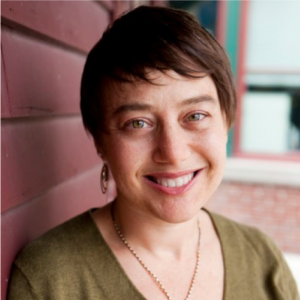
By Jewcer

Bio:
Idit Klein has been an activist for equality and social justice for the past 20 years. Since 2001, she has served as Executive Director of Keshet. In Massachusetts, Idit helped mobilize Massachusetts rabbis and synagogue members to defeat the proposed constitutional amendment to ban gay marriage. She also served as the Executive Producer of Keshet’s award- winning documentary film Hineini: Coming Out in a Jewish High School. Prior to leading Keshet, Idit was an activist in the queer women’s community in Israel and played a role in early organizing efforts to create the Jerusalem Open House. She has worked for social justice organizations in Jerusalem and in Boston including SHATIL, the Israel/Palestine Center for Research & Information, and Community Work Services. Idit was among eight recipients of the 2003-2005 Joshua Venture Fellowship. A magna cum laude graduate of Yale University, Klein received her Master’s in Education from the University of Massachusetts Amherst with a focus on social justice and anti-oppression education. She is also a certified facilitator of the Center for Leadership Initiatives. Idit was among eight recipients of the 2003-2005 Joshua Venture Fellowship for young Jewish social entrepreneurs. A board member of JOINf or Justice and a past fellow, Klein was honored by the Jewish Women’s Archive with a Women who Dared award and named to the Forward 50.

Keshet is an organization with a mission of creating full equality and inclusion for Lesbian, Gay, Bisexual, and Transgender Jews. We started off as a local organization in Boston and then expanded nationally. We consult and train Jewish communities and institutions around the country on how to create more inclusive Jewish environments. We focus on youth-serving institutions – day schools, Hebrew schools, summer camps, and youth movements. In addition to training educators, we also do leadership development work with parents of LGBT kids and directly with LGBT teens in Jewish youth movements.
Keshet brings people into the Jewish community that otherwise might have felt alienated or rejected by Jewish life. It allows people to be their own authentic selves. The initiatives of Keshet enable all people, both gay and straight, to think about the bias and issues of sexual orientation, gender identity, and inclusion in a critical way. We have also helped move much of the Jewish community to a place that supports gay initiatives more broadly. This, in my mind, puts the American Jewish community on the right side of history.
When I came out, I was someone who did not doubt for a millisecond that I could be both gay and Jewish. I identified as Israeli and Jewish, and I didn’t go through any internal questioning period of whether I could be gay and Jewish. However, many people I met expected me to be going through a painful internal process of contradiction. There were many people who weren’t out that would tell me secretly that they had many negative experiences in their childhood Jewish communities and felt scared to come out. I felt it was a contradiction that there were people who didn’t feel there was a place for them in the Jewish community. And at the time there were no Jewish institutions taking the leadership role on LGBT issues. I wanted to create this community that has always been my home in the world, a place that I could feel proud of.
Proving the need for the work in a way that is compelling and inspires people to stand with you and to fund you. This is especially difficult for an organization like Keshet that deals with issues which people may be reluctant to address.
It is hard to pinpoint just one. If you asked me this question in 2001 there probably would have been just one or two organizations that I would have named. But since then, innovative social justice work has flourished in the Jewish community. And today I cannot name just one without leaving out so many others.